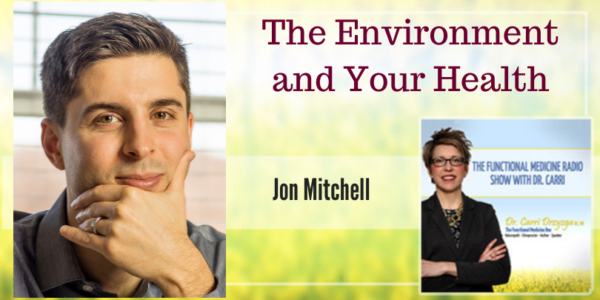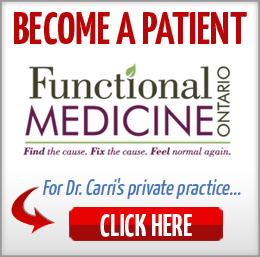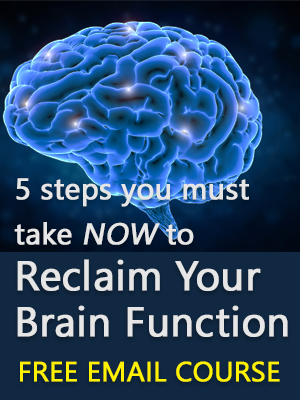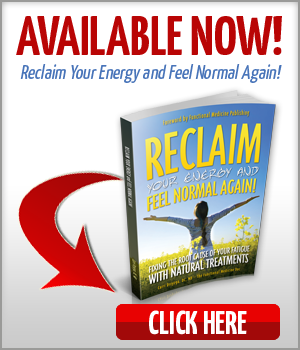Podcast: Play in new window | Download
Subscribe: Apple Podcasts | Android | RSS
In this episode of The Functional Medicine Radio Show, Dr. Carri’s special guest Jon Mitchell talks about the relationship between the environment and your health.
Jon Mitchell is a certified Physician Assistant turned Functional Medicine Health Consultant who shows driven professionals how to get abundant and sustained energy, mental clarity, and resolve their chronic health issues.
Main Questions Asked about the Environment and Your Health:
- How does the external environment impact our health?
- When it comes to the environment and your health, is there one area that you typically get the most bang for your buck?
- Can you talk about the use of light boxes?
- What about blue light?
- What about water and the minerals? How do you test water?
- What about air quality?
- What about noise pollution?
Key Points made by Jon about the Environment and Your Health:
- The framework that I work people through begins with working on their environment, and then we start moving onto those other things like the gut, hormones, etc.
- Things like your air, water, light, sound, EMFs and food are all going to influence a lot of the different functions within your body and at very basic level.
- A lot of times once you correct those things, everything else downstream works itself out.
- When it comes to the environment and your health, everybody is a little bit different in what is affecting them most and what they need to work on. One thing I like to work on is light.
- In our technology-driven life, we’re constantly being bathed in artificial light and it’s not normal, it’s just common. It has biological effects that we don’t realize.
- Our cellphones, laptops, TVs, even LED lights all produce blue light. Blue light is stimulatory, it suppresses melatonin. Melatonin helps us get to sleep and helps set our circadian rhythms. It is also an important anabolic hormone and a very powerful antioxidant. I try to get my clients to think about their exposure to light and try to mitigate that exposure, put on some glasses that block the blue light.
- We do want to get out in the sun (just don’t burn). The first thing when you wake up, get outside in the sun, show as much skin as possible; then throughout the day you want to get some sun.
- It’s tough in the winter, especially up in Canada, because you’re typically not going to get the UVB light that will help with vitamin D production. However, getting outside or getting sunlight through the window is going to help entrain the circadian rhythm, which is going to be helpful in a lot of ways, e.g., serotonin is converted via UVA light, so light from the sun is actually going to make us happier.
- Light boxes can be very useful, especially people dealing with depression and seasonal affective disorder.
- It’s important to understand that there is no wavelength of light that is inherently bad, it depends on how much you’re getting and the full spectrum of light. Light boxes can be very useful for that type of thing.
- Using glasses at night will change the way everything looks; everything will look red and orange which is what you want to emphasize at nighttime.
- I usually want clients to avoid the blue light for two to three hours, minimum. It takes that long for your body to calibrate.
- Sleep is also triggered by a drop in temperature, so another tip for improving sleep is to drop the temperature in your home a little bit before getting ready for bed.
- There are apps that you can use to change the background light, I like them, but I think we tend to forget about all the other types of light that we’re getting. I think using the glasses makes the most sense because it’s very easy to do and you can still go about the evening without worrying too much about it.
- The reason I focus on all these different environmental factors, the air, the water, the light, is because these are things we’re exposed to day in and day out.
- On average, we should be drinking about three litres of water a day, but the question is, “What’s in your water?”
- In general, people don’t realize that there are a lot of contaminants in the water. We trust our municipalities, but when I actually test the water supply of my clients, it gives a whole different picture of what’s going on.
- It’s important to understand that just because you don’t notice something in your environment; it doesn’t mean that it’s not wearing you down.
- Just because you think your government is regulating these things, they usually aren’t doing a very good job.
- If we’re talking about filtering water, I like reverse osmosis, but it’s important that you have a remineralizer because reverse osmosis will take up all the minerals too, and we need minerals to maintain our body and our health.
- I also like a shower filter because shower water gets hot, it will be aerosolized, and you will breath in anything that is in the water and it will be absorbed into your skin.
- I tend, at this point, not to test water because once I say, get the filter, it’s actually cheaper to just get a filter than to test.
- What I want people to understand is that there is always a reason why you are developing some symptoms that are put in the name of a disease state. What we’re interested in is to get to the root of it and say, what are all the things that could be contributing to your disease state?
- When it comes to the environment and your health, people need to understand that they’re unique. They have unique genetics and upbringing, lifestyle, environment, that shapes how they are feeling. A cookie cutter protocol is not typically going to get the results, particularly for a complex case.
- When it comes to thinking about air quality, most people think about outdoor air – emissions from cars, industrial plants, There’s no question that it affects us, it accumulates in our bodies and takes energy, minerals, enzymes to detoxify that could be used towards other things.
- The other important thing to realize is that your indoor air can be just as toxic, if not worse. Most people don’t realize this. The home is a confined environment with little to no air circulation. If you’re using cleaning chemicals, if you have furniture with flame retardants on it, certain paints give off volatile organic compounds (VOCs), all these things are gassing off into your environment and you’re breathing them in daily.
- Again, you can test, but I just like to go with a high-quality air filter or high quality HEPA filter to really make sure your house is clean; and working on changing out the different things we can.
- The bedroom is a huge place that we tend to have to do a lot of work.
- Old homes are sick homes, old buildings are sick buildings. It seems like almost everyday I’m hearing about some building that still has asbestos in it. If you’re in that type of environment, the first thing to do is, if you can, get out. If not, bring in your own filter or air filtering plants like an aloe or peace lily.
- Noise can be a big issue, especially if you live in a city or near a highway. Noise will disrupt your sleep, it can increase your risk for heart disease, it can increase your anxiety.
- We need to be cognizant of the sound we’re exposed to; even if we don’t recognize it on a conscious level, our body is picking it up and it does have physiological effects.
- I like people to work getting some quiet time throughout the day, whether it’s a walk in the park or a quiet room. You just want to make sure that you are getting some time where it’s nice and quiet and you can relax. The most important time is bedtime.
- The most important time is bedtime. You want your bedroom to be as quiet as possible.
- One last thing I like people to think about is how they breathe. You want to be nose breathing and you want to make sure that it’s nice and calm. If you work on that, you can actually increase your oxygenation and improve your sleep quality.
Resources Mentioned for the Environment and Your Health:
Book – Reclaim Your Energy and Feel Normal Again
Thank you for listening! If you enjoyed this podcast, please subscribe and leave a 5 star rating and review on iTunes!




